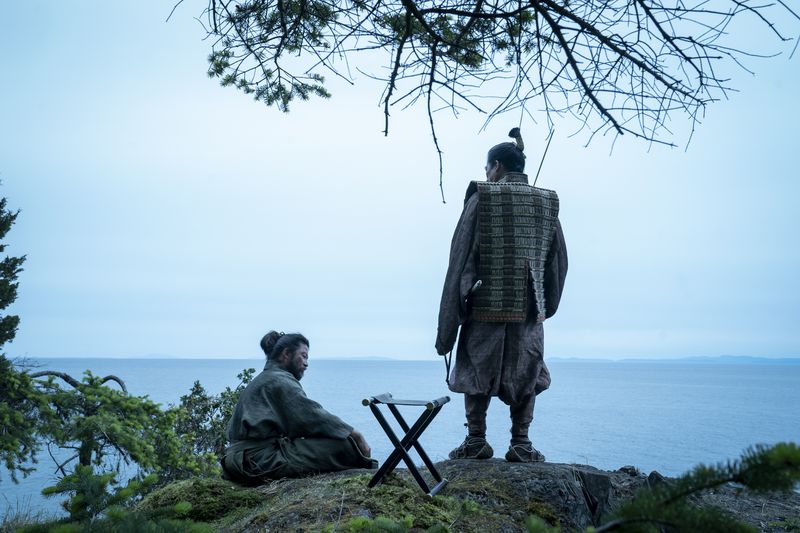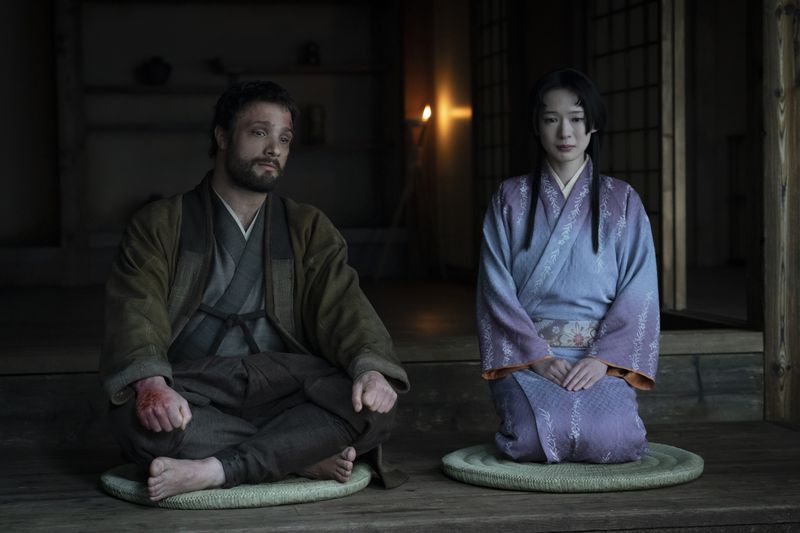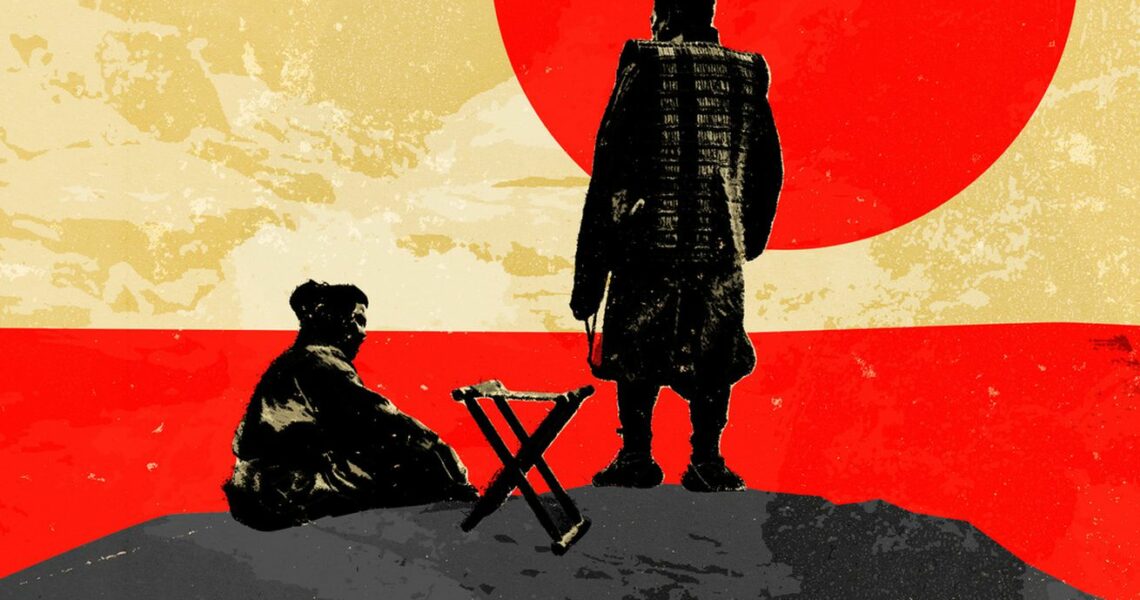
In the finale of ‘Shogun,’ “A Dream of a Dream,” FX’s acclaimed series ends as it began: highlighting character over spectacle
/cdn.vox-cdn.com/uploads/chorus_asset/file/25413391/spoiler_warning_v2.2.jpg)
In the sixth episode of Shogun, Lord Yoshii Toranaga’s (Hiroyuki Sanada) war council gathers in Ajiro to form a strategy against Lady Ochiba (Fumi Nikaido), Lord Ishido Kazunari (Takehiro Hira), and their manipulations of the Council of Regents. With a depleted army and few options at the war council’s disposal, Toda Hiromatsu (Tokuma Nishioka) suggests that the time has finally come for “Crimson Sky.” Hiromatsu describes the perilous plan as a “single, violent rush on Osaka Castle,” one that would eliminate the Council of Regents and form a new government, with Toranaga as sole regent: shogun.
Although Toranaga initially refuses to proceed with Crimson Sky, by the end of the episode, he declares that his clan must protect the taiko’s heir from the traitorous Council of Regents and that Crimson Sky is their only choice. It’s a promise that war is coming to Japan, and the prospect of the epic battle looms over each of the following episodes. Even with the subsequent betrayal by Toranaga’s half brother, Saeki Nobutatsu (Eita Okuno), and the deaths of Hiromatsu and Toranaga’s son, Nagakado (Yuki Kura), the assault on Osaka felt inevitable. Last week’s penultimate episode, titled “Crimson Sky,” all but promised to feature Toranaga’s long-awaited attack on Osaka Castle—and yet he and his army never even set foot in the city. The most important strike is fought only with words, as Lady Mariko (Anna Sawai) stands in defiance of Ochiba and Ishido to sow division between Toranaga’s enemies from within the castle walls.
With Mariko’s shocking death in the closing moments of the ninth episode, the stage had been set for Toranaga’s attack to actually arrive in the series finale. But the violent conflict never comes. The only battle in the finale appears in the form of a vision, as Toranaga describes to Kashigi Yabushige (Tadanobu Asano) the conflict that will take place in one month’s time, the famed Battle of Sekigahara, in which Ishido will learn that he has lost the support of the heir’s army and that all of the other regents have united against him. Toranaga reveals that Crimson Sky had already succeeded, the single rush delivered by one person: Mariko. “With the regents united, I could never send an army to Osaka,” Toranaga explains to Yabushige. “It would have meant certain death. So I sent a woman to do what an army never could.”
Shogun’s series finale, “A Dream of a Dream,” which premiered on Hulu on Tuesday, caps a season that featured masterful storytelling, excellent acting performances, and one of the most immersive worlds depicted on television in recent memory. “A Dream of a Dream” is a beautiful, understated conclusion that prioritizes character over spectacle, coalescing the entire journey across the season as Toranaga finally ascends to power.
In the early reviews of Shogun, many critics naturally compared the FX series to HBO’s Game of Thrones—another show with epic scale, gore, political maneuvering, and enough names and alliances that a grove of family trees felt like a necessary viewing companion to keep track of everyone. Even still, Shogun director Jonathan van Tulleken argued that the series was more akin to the character-driven political dramas of Succession and House of Cards. At the end of the 10-episode season, it’s easy to see why. Shogun had its fair share of thrilling action sequences, but it was never interested in producing its own version of “The Long Night” or “Battle of the Bastards.” Despite the abundance of beheadings throughout the series, Shogun’s battles were few and far between, with its most captivating confrontations often occurring in conversation.
So much of Shogun is set in the periphery of a war that never takes shape on-screen in earnest, as the series commits itself to engaging with the machinations behind it: every character’s reach for power or sense of agency. “A Dream of a Dream” cleverly upends audience expectations by performing a narrative ruse befitting a story that ultimately belongs to Toranaga. The cunning warlord, played with a reserved grace by Sanada, is an enigma to even his closest confidants throughout the season. But the finale showcases his brilliance—and ruthlessness—in all of its glory.
When Yabushige and John Blackthorne (Cosmo Jarvis) return to Ajiro, they find that the already devastated fishing village has fallen into an even deeper state of despair. Yabushige is ousted as a traitor and sentenced to commit seppuku by sunset the following day, while Blackthorne discovers that his beloved ship has been destroyed. He’s informed that it was the nefarious work of Christians and that Toranaga has ordered a violent and merciless search throughout Ajiro to weed out those who abetted them. Thanks to Father Martin Alvito’s (Tommy Bastow) parting words to Blackthorne in Osaka, he quickly realizes that it was Mariko who essentially burned his ship as part of an agreement she made with the church to save his life. He says as much to Toranaga, as Blackthorne asks for him to end the suffering in Ajiro, but Toranaga refuses his request all the same.
As Toranaga later reveals to Yabushige, just before Yabushige is set to die for the role he played in Mariko’s death, Toranaga was the one who arranged for Blackthorne’s ship to be burned. “It was a necessary ruse to test the Anjin,” Toranaga tells Yabushige, explaining that he’ll likely have to destroy the next ship that Blackthorne rebuilds, too. Toranaga is sacrificing the lives of Ajiro’s residents, knowing all too well that they are innocent of the crimes they’re suspected of, just to test Blackthorne and tighten his control over him.
“How does it feel to shape the wind to your will?” Yabushige finally asks Toranaga.
“I don’t control the wind,” he replies. “I only study it.”
Yabushige greedily digs for more and more information from Toranaga, desperate to hear about the forthcoming events that will occur after his death and to understand how Toranaga is always one step ahead of his enemies. With nothing to lose, Toranaga complies, revealing the true nature of his schemes as he walks Yabushige through the victory he had failed to foresee. Only when Yabushige pleads for Toranaga to confess to him whether he had always desired to become shogun—if he was like every other power-hungry warlord in his secret heart—does Toranaga finally grow weary of all the questions and prepare to honor his promise to be the second to Yabushige’s seppuku. “Why tell a dead man the future?” he asks coldly as Yabushige accepts his fate and looks into his liege lord’s eyes as Toranaga takes his life.
It’s a fantastic scene that serves as a fitting end to Asano’s Yabushige, who played his role as the predictable traitor in Toranaga’s designs to perfection (while also serving as one of the series’ most likable and charismatic characters). It’s also a somewhat risky narrative decision by Shogun’s creative team to opt for the exposition of the events still to come instead of the grand action of a massive set piece; they place their trust in the actors’ performances and the show’s excellent writing.

FX
The finale showcases the growth of just about every one of the show’s major characters, but none more than Blackthorne. As much as Shogun is about Toranaga’s rise to power, it’s also the story of the shipwrecked English navigator. It’s about his journey of accepting the culture and customs of his former Japanese captors as he comes to respect them more than the Dutch crew he arrived with. In “A Dream of a Dream,” all of the lessons he’s learned from Mariko are put on full display. Whether it’s in his improved proficiency with the Japanese language, the wordless act of carefully avoiding the moss in his house’s rock garden, or how he is prepared to die for the injustices against Ajiro, Mariko’s influence on the “barbarian” is seen at every turn. When Blackthorne threatens to end his life in protest of Toranaga’s actions (even if he hasn’t quite grasped how to properly commit seppuku), he models his phrasing after Mariko’s protestation of Ishido’s dishonorable attack as she was killed in the ninth episode—and he quietly echoes her words to himself as he attempts to follow through with the act: “We live, and we die.”
The aftermath of last week’s tragic conclusion bleeds into the opening credits of the finale, with Blackthorne holding Mariko’s lifeless body in his arms as her loved ones cry out in pain and as Yabushige privately begs for forgiveness in the background. Her absence—and tremendous impact—is all over the remainder of the episode, adding even greater depth and significance to one of the show’s most important and engrossing characters. Sawai’s star-making turn as Mariko provided the perfect foil to the show’s central male perspectives, focusing on her courage and strength to impose her will and honor her father’s complicated legacy within the societal strictures women faced in this fictionalized era of Japanese history. Her words beneath her veiled politeness could cut down her enemies such that she never needed to lift her naginata (though she was pretty good with her blade, too).
Mariko’s words were her greatest weapon, and they reemerge throughout the episode as her friends remember and mourn her. After receiving Lady Ochiba’s secret pledge to pull back the heir’s army when the time comes, Toranaga recites the poem that Mariko spoke to him following Hiromatsu’s death and acknowledges her outsize role in securing his victory. “Only her words remain now,” Toranaga says. “But what a bonfire she made.”
The Shogun finale delivers a number of quiet yet devastating scenes to wind the series to a close. One of the most subtle and impactful moments comes when Blackthorne sits in his home, overlooking its rock garden in peace, as his consort, Usami Fuji (Moeka Hoshi), joins him at his side. They exchange pleasantries, and after a brief interlude of silence, Blackthorne glances at the empty space to his right, where Mariko used to sit beside them, cueing somber piano chords in the dynamic score from Atticus Ross, Leopold Ross, and Nick Chuba. As Fuji catches his wandering gaze, Blackthorne simply says “no translator” in Japanese, and Fuji tearfully nods in silent understanding.

FX
Fuji, who stole scenes with her tea-sipping side eyes, is one of several supporting characters who get a satisfying end to their part in the larger story. With Fuji’s service to Toranaga fulfilled, she informs Blackthorne that she’ll be leaving their home to become a nun—just as she once begged Mariko for when she was first assigned to serve the “barbarian.” Their mutual respect and admiration for each other has grown tremendously since they were stuck together after Toranaga named Blackthorne his hatamoto, and even without the mediation of their beloved translator, they’re able to understand each other’s emotions and intentions. Together, they say goodbye to their loved ones as Fuji releases the ashes of her late son and husband into the sea and Blackthorne drops Mariko’s cross into the water after her.
Meanwhile, the clever lord of Ajiro, Kashigi Omi (Hiroto Kanai), is positioned to become Toranaga’s vassal after his uncle Yabushige’s death. Toranaga’s faithful spy, Muraji (Yasunari Takeshima), finally reveals his true identity as his lord’s faithful samurai to Blackthorne. Even the visibly grief-stricken Buntaro (Shinnosuke Abe) gets his moment as he sets aside his differences with Blackthorne to help the other villagers pull Blackthorne’s broken ship from the water—the last remnants of his former life—in the episode’s final minutes.
In the end, Blackthorne is the only character whose fate is left with shades of ambiguity. “A Dream of a Dream” begins with what appears to be a flash-forward: Blackthorne, now old and gray, lies in a lavish bed back in what is presumably England, his grandchildren quietly marveling at the artifacts he brought back from Japan—trophies he collected from the “savages.” The finale cuts into this future setting throughout the episode, as if Blackthorne is recalling his past, often linking the quick time jumps with his present-day thoughts of Mariko. However, whether Blackthorne actually ever makes it out of Japan is left as a mystery; he could be merely daydreaming in his grief. He appears to be clutching Mariko’s cross in the future, which he dropped into the sea, and Toranaga himself told Yabushige, “I don’t think it’s his fate to ever leave Japan.” (And that says a lot coming from the all-seeing warlord who seems hell-bent on burning this man’s ship over and over again.)
Could the episode title, “A Dream of a Dream,” refer to Blackthorne—dreaming of his potential future in the present as his withered, old self dreams of his past? Is it referencing Toranaga’s vision of the Battle of Sekigahara, as he nears his dream of ushering in a great era of peace in Japan? Or is the title merely an allusion to the words of the late taiko, who, on his deathbed in the second episode, said, “So strange, this life. … Just a dream of a dream.”
Whatever the case may be, Shogun concludes before we find out what becomes of Blackthorne beyond his renewed loyalty to Toranaga, who orders Blackthorne to build him a fleet of ships. (For what it’s worth, William Adams, the English sea pilot whom Blackthorne is loosely based on, never left Japan, despite receiving permission to return home to England.) With James Clavell’s 1,200-word novel serving as the show’s source material, FX could have certainly tried to extend Shogun by spreading its lengthy story into multiple seasons. But cocreators Justin Marks and Rachel Kondo, along with the rest of their creative team, did a tremendous job of condensing the unwieldy text into 10 enthralling episodes of television, spacing out a complex narrative and rich characters with economic precision. There’s always the chance that the showrunners could venture beyond the confines of Clavell’s novel or otherwise adapt another one of the late author’s books in his Asian Saga as a spiritual successor, but it seems as if Shogun is ending as it was intended to.
“We took the story to the end of the book and put a period at the end of that sentence,” Marks told The Hollywood Reporter. “We love how the book ends; it was one of the reasons why we both knew we wanted to do it—and we ended in exactly that place.”
Shogun leaves its audience wishing for more; the finale ends with Toranaga still only on the precipice of becoming the titular military ruler who will unify Japan and usher in centuries of peace. And yet unlike Blackthorne’s fate, we know what Toranaga’s will be. After a final shot of Toranaga looking out into the distance, perhaps dreaming of fulfilling his destiny once and for all, the flash of the closing title screen promises that his vision will come to fruition—just as he foretold.

